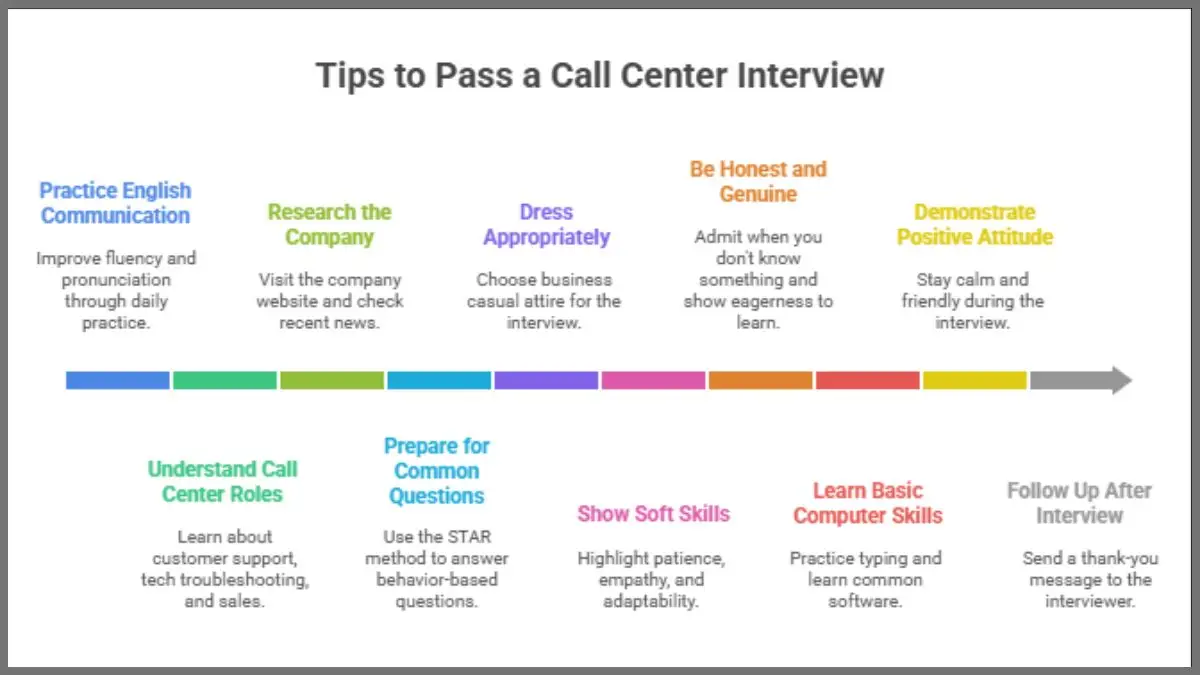Are you preparing for your first call center interview and not sure where to start? Don’t worry—you’re not alone! Many people stepping into the customer service world for the first time feel overwhelmed. The good news? With the right mindset and preparation, anyone can ace a call center interview, even beginners.
In today’s fast-paced digital world, call centers remain essential for customer support. In fact, a 2023 report by Statista showed global call center revenue reached over $480 billion, and the demand for call center agents continues to rise, especially in countries like the Philippines, India, and the U.S. That creates a lot of opportunity for entry-level applicants.
In this guide, we’ll walk you through tips to pass a call center interview for beginners using practical, easy-to-follow tips that can give you the edge you need to land the job.
What to Expect in a Call Center Interview
Before diving into preparation tips, it helps to know what the typical interview process looks like. Most call center interviews follow a fairly standard pattern:
- Initial screening – Often done over the phone to assess your communication skills.
- In-person or video interview – With a hiring manager or recruiter.
- Basic skills assessment test – These may include typing tests or scenario-based questions.
- Final interview or offer – If you’ve made it this far, you’re almost there!
Knowing what to expect eases anxiety and helps you prepare more strategically.
Tips to Pass a Call Center Interview
1. Practice English Communication
Why it matters: Communication is at the heart of every call center job. Most companies—especially those dealing with international clients—expect agents to speak clear and fluent English.
How to improve it:
- Read aloud daily – Try reading news articles or books out loud. It helps with fluency and pronunciation.
- Watch English shows or YouTube tutorials – Focus on tone, pronunciation, and common phrases.
- Practice with friends – Do mock interviews or casual conversations in English.
Even spending just an hour a day on this can boost your confidence quickly.
2. Understand What a Call Center Does
If you’re a beginner, you might think call centers are just about answering phones. But there’s more to it.
Call centers today handle:
- Customer support
- Technical troubleshooting
- Sales and upselling
- Chat and email support
Knowing what kind of position you’re applying for helps tailor your answers and attitude. For example, a sales-oriented call center might look for someone more persuasive and energetic, while a tech support role demands problem-solving skills.
3. Do Some Background Research
Let’s say you’re applying at XYZ BPO Services. Before your interview, take 10 minutes to:
- Visit their website and read about what they do.
- Check recent news or any awards the company has received.
- Understand what kind of clients they serve.
Employers love it when candidates show initiative. A simple line like, “I noticed you recently expanded your customer care department—I’d love to be part of that growth,” can impress interviewers.
Along with researching the company, make sure your resume highlights the right skills. Check out this guide on writing a strong call center resume objective to improve your chances.
4. Prepare for Common Interview Questions
Most call center interviews include similar questions. Here are some you’re likely to hear:
- “Can you tell me about yourself?”
- “Why do you want to work in a call center?”
- “How would you handle an angry customer?”
- “What are your strengths and weaknesses?”
Use the STAR method (Situation, Task, Action, Result) to answer behavior-based questions. This shows hiring managers that you can think critically and respond professionally under pressure.
Example:
Question: “Tell me about a time you helped solve a problem.”
Answer: “In my previous job as a cashier, a customer was unhappy about a billing error. I calmly explained the issue, apologized, and corrected it. The customer left satisfied, and it taught me the importance of patience and clear communication.”
5. Dress the Part
Even if the job is remote or casual, first impressions count. Dress appropriately and neatly for your interview. Business casual is typically a safe choice. If you’re doing a video interview, make sure you’re in a quiet, well-lit space with good internet.
6. Show Your Soft Skills
Hard skills like typing speed are essential, but soft skills are equally important:
- Patience and empathy
- Active listening
- Adaptability under pressure
- Time management
You can highlight these even if you’ve never worked in a call center. For instance, if you handled complaints at a bakery or helped classmates during group work—those experiences count too!
7. Be Honest and Genuine
Don’t pretend to know everything. If you’re asked a question that stumps you, it’s okay to say, “I’m not familiar with that yet, but I’m very eager to learn.” Interviewers appreciate sincerity over bluffing.
8. Learn Basic Computer Skills
Call center agents use various tools like ticketing systems (e.g., Zendesk), customer databases (e.g., Salesforce), and even AI-powered chat tools.
If you’re new to all this, start with the basics:
- Learn how to navigate Google Workspace or Microsoft Office.
- Practice typing—aim for at least 35-40 words per minute.
- Watch tutorials on common software used in call centers.
Recent advancements in technology—like AI chatbots—have shifted call center roles toward more complex, human-only interactions. This means being tech-savvy gives you an advantage.
9. Demonstrate a Positive Attitude
Call center work isn’t always easy, especially during high-stress calls. Showing that you can stay calm, friendly, and professional—even when things get tough—is a huge plus.
Smile during the interview—it affects your tone and makes you sound more pleasant, even on the phone.
10. Follow Up After the Interview
After the interview, send a short thank-you message via email or text. Here’s a sample:
“Hi [interviewer’s name], thank you for the opportunity to interview for the customer support position. I appreciate your time and look forward to hearing from you. Have a great day!”
This simple act of courtesy can set you apart from other candidates.
Final Thoughts
Starting your career journey in a call center environment can open many doors. In fact, many top professionals in BPOs started with zero experience! With the tips we’ve covered—like practicing communication, preparing answers, and showing confidence—you’ll be one step closer to landing that job.
Remember: Every expert was once a beginner. Stay curious, keep learning, and show them you’re someone worth investing in.
Good luck—you’ve got this!





